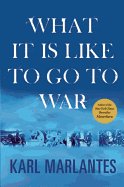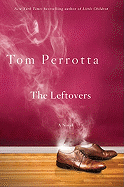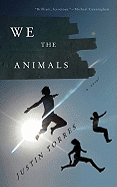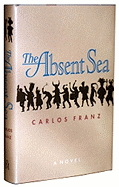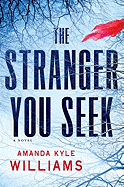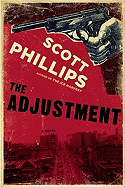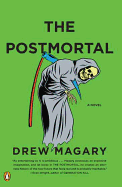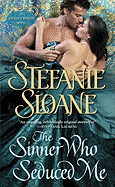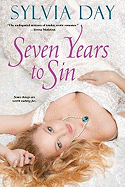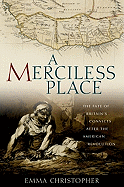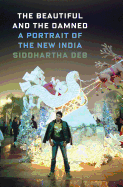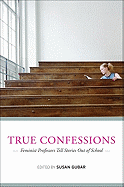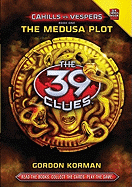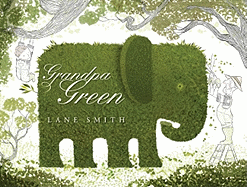 When Justin Torres, author of the new novel We the Animals (Houghton Mifflin Harcourt), appears on September 13 at McNally Jackson Books in New York City as part of his national book tour, it'll be a homecoming of sorts for the debut novelist: Torres is a former bookseller at that exceptional bookstore. Told through a series of vignettes, We the Animals (see review below) is the story of three brothers growing up in the shadow of their young parents' passionate, sometimes violent marriage.
When Justin Torres, author of the new novel We the Animals (Houghton Mifflin Harcourt), appears on September 13 at McNally Jackson Books in New York City as part of his national book tour, it'll be a homecoming of sorts for the debut novelist: Torres is a former bookseller at that exceptional bookstore. Told through a series of vignettes, We the Animals (see review below) is the story of three brothers growing up in the shadow of their young parents' passionate, sometimes violent marriage.
Torres began writing the novel as a way to help understand his confusion and anger about aspects of his past. "You arrive at forgiveness through understanding," he explained. Creating characters and exploring their motivations and reasons for treating one another the way they do "helped me in my own personal life, to get past grudges I held."
Woven into the novel are some details from Torres's own life, what the 31-year-old author called "the hard facts." Like the narrator in We the Animals, he has two brothers; his father is Puerto Rican; his mother, who is white, worked in a brewery; and he spent his childhood in upstate New York.
Several years ago, while living in New York City and between jobs, Torres took the last of his savings and signed up for a creative writing class. Interested in pursuing the craft further, he was referred to Jackson Taylor, an instructor at the New School and a novelist (The Blue Orchard).
"Jackson really challenged me. I was engaged in all kinds of self-destructive behaviors and wandering through my life," Torres said. "He asked me, 'What do you want five years from now?' I had not even considered that. I just wasn't thinking about the future. That was the moment when I was like, okay, this writing thing; I'm going to pursue it seriously."
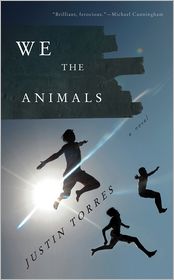 In the five years since Torres's exchange with Taylor, he has made good on his declaration to dedicate himself to writing. His work has been published in Tin House, Granta and Glimmer Train, and he received a fellowship to attend the Iowa Writers' Workshop. "It all happened really quickly once I buckled down and was given the chance to sit with my thoughts and do the work," he said.
In the five years since Torres's exchange with Taylor, he has made good on his declaration to dedicate himself to writing. His work has been published in Tin House, Granta and Glimmer Train, and he received a fellowship to attend the Iowa Writers' Workshop. "It all happened really quickly once I buckled down and was given the chance to sit with my thoughts and do the work," he said.
Torres has studied creative writing with the likes of Marilynne Robinson, Dorothy Allison and Michael Cunningham. "My favorite hobby is finding teachers to admire, then admiring the hell out of them," he wrote in the acknowledgments section of We the Animals, which Cunningham has called "a dark jewel of a book."
It's not only those heavyweight scribes Torres credits for aiding him on the path to publication. He also gave a nod to his high school English teacher, who helped him through some tough times and with whom he still keeps in touch. "Even more than never giving up on me, I think she spotted some potential within me and really nourished it," Torres said.
The publication of We the Animals caps off an exciting summer for Torres, who not only had his first short story appear in the August 1 issue of the New Yorker but also spent time trekking across glaciers in Alaska. A fall left him with a concussion, and his computer was off limits for a time because of a light sensitivity. He took the opportunity to rest up before setting out on a tour that's taking him to more than 20 cities. "I love traveling. I love bookstores. Whenever I'm in a new town I always stop into the local bookstore, so this is basically a dream vacation," said Torres.
A customer recently called Eagle Harbor Book Co. on Bainbridge Island, Wash., asking if copies of We the Animals had arrived. After being told Torres is making an appearance there on October 27, the eager, honest reader responded, "Finally, you have an event I want to attend." Debut novels that staffers at Eagle Harbor are particularly enthusiastic about tend to do well, like Karl Marlantes's Matterhorn--which bodes well for We the Animals. Events coordinator Mary Gleysteen and others have been won over by Torres's tale, which she described in the store's newsletter as "a breathtaking book about family, love, poverty and coming of age, told from the viewpoint of the youngest of three brothers. The characters are all too human, and the language is stark and plain and real."
Along with McNally Jackson and Eagle Harbor Book Co., other stops on Torres's itinerary include Prairie Lights in Iowa City (September 21); Politics and Prose (September 15) in Washington, D.C., where Torres once delivered vegetables to customers while working as a farm hand in Virginia; BookPeople in Austin (October 25), where he lived with a friend for a time while applying to graduate schools; Green Apple Books (September 29) in San Francisco , his current city of residence; and the campus bookstore at Stanford University (November 30), where he is a Wallace Stegner Fellow.
While on tour, Torres is looking forward to connecting with readers and hearing what they have to say about We the Animals. "It's been my experience so far that folks can ask some surprisingly difficult questions," he said, "and I like that challenge." --Shannon McKenna Schmidt
Portrait of the Artist: Justin Torres
 Karl is one of the nicest and most thoughtful authors we've met. A great speaker, he is embarking on a tour for What It Is Like to Go to War. If you can attend one of his events, we heartily recommend it. If not, you can meet him through his wonderful books.
Karl is one of the nicest and most thoughtful authors we've met. A great speaker, he is embarking on a tour for What It Is Like to Go to War. If you can attend one of his events, we heartily recommend it. If not, you can meet him through his wonderful books. 



 When Justin Torres, author of the new novel We the Animals (Houghton Mifflin Harcourt), appears on September 13 at McNally Jackson Books in New York City as part of his national book tour, it'll be a homecoming of sorts for the debut novelist: Torres is a former bookseller at that exceptional bookstore. Told through a series of vignettes, We the Animals (see review below) is the story of three brothers growing up in the shadow of their young parents' passionate, sometimes violent marriage.
When Justin Torres, author of the new novel We the Animals (Houghton Mifflin Harcourt), appears on September 13 at McNally Jackson Books in New York City as part of his national book tour, it'll be a homecoming of sorts for the debut novelist: Torres is a former bookseller at that exceptional bookstore. Told through a series of vignettes, We the Animals (see review below) is the story of three brothers growing up in the shadow of their young parents' passionate, sometimes violent marriage. In the five years since Torres's exchange with Taylor, he has made good on his declaration to dedicate himself to writing. His work has been published in Tin House, Granta and Glimmer Train, and he received a fellowship to attend the Iowa Writers' Workshop. "It all happened really quickly once I buckled down and was given the chance to sit with my thoughts and do the work," he said.
In the five years since Torres's exchange with Taylor, he has made good on his declaration to dedicate himself to writing. His work has been published in Tin House, Granta and Glimmer Train, and he received a fellowship to attend the Iowa Writers' Workshop. "It all happened really quickly once I buckled down and was given the chance to sit with my thoughts and do the work," he said.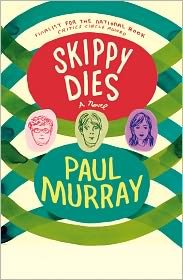 Skippy Dies by Irish writer Paul Murray was one of our favorite novels of 2010 and is being published today by Faber & Faber for $16 in trade paper. It turned up on many "Best of..." lists and is slated to be a Neil Jordan movie adaptation.
Skippy Dies by Irish writer Paul Murray was one of our favorite novels of 2010 and is being published today by Faber & Faber for $16 in trade paper. It turned up on many "Best of..." lists and is slated to be a Neil Jordan movie adaptation.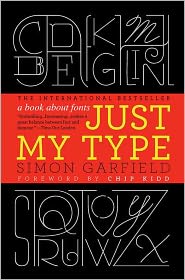 Whether you're a font aficionado like blurber Maira Kalman ("Did I love this book? My daughter's middle name is Bodoni. Enough said.") or a mere text gawker, Just My Type: A Book About Fonts by Simon Garfield is great fun and great education, too. You'll discover the truth about the Ikea "fontroversy" of 2009; why one font can sell candy and another is better suited to obituaries; why professional typographers have long arguments about serifs; and much more
Whether you're a font aficionado like blurber Maira Kalman ("Did I love this book? My daughter's middle name is Bodoni. Enough said.") or a mere text gawker, Just My Type: A Book About Fonts by Simon Garfield is great fun and great education, too. You'll discover the truth about the Ikea "fontroversy" of 2009; why one font can sell candy and another is better suited to obituaries; why professional typographers have long arguments about serifs; and much more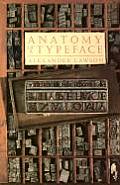 Anatomy of a Typeface by Alexander Lawson might seem at first to be a professional's handbook, but closer perusal will delight font lovers at all levels. Lawson has information-packed chapters on different varieties of typefaces, so if you don't find a crucial detail in Garfield's book, this one is a great reference.
Anatomy of a Typeface by Alexander Lawson might seem at first to be a professional's handbook, but closer perusal will delight font lovers at all levels. Lawson has information-packed chapters on different varieties of typefaces, so if you don't find a crucial detail in Garfield's book, this one is a great reference.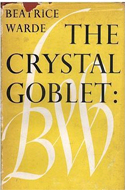 In her title essay in The Crystal Goblet: Sixteen Essays on Typography, Beatrice Warde argues that one drinks wine from crystal because "everything about it is calculated to reveal rather than to hide the beautiful thing which it was meant to contain." Thus, typeface should be designed to reveal content and not to show off the shapes and flourishes of individual letters. Older and wiser, this book.
In her title essay in The Crystal Goblet: Sixteen Essays on Typography, Beatrice Warde argues that one drinks wine from crystal because "everything about it is calculated to reveal rather than to hide the beautiful thing which it was meant to contain." Thus, typeface should be designed to reveal content and not to show off the shapes and flourishes of individual letters. Older and wiser, this book.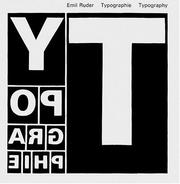 Typographie: A Manual of Design by Emil Ruder is a textbook in its sixth printing, and while it is meant to be a tool for teachers and students, any reader will delight in flipping through its pages and getting a better understanding of which elements of text and typography stand out in different contexts. --
Typographie: A Manual of Design by Emil Ruder is a textbook in its sixth printing, and while it is meant to be a tool for teachers and students, any reader will delight in flipping through its pages and getting a better understanding of which elements of text and typography stand out in different contexts. -- "In addition to a water filtration system, mismatched socks and 10 pounds of snacks from Sahadi's (my favorite Middle Eastern grocer)," Martin e-mailed just before heading to the airport, "I've packed Peter Matthiessen's travel writing classic The Snow Leopard. I am inspired by his curiosity and sense of wonder, and think it will be reassuring to have his companionable voice along with us."
"In addition to a water filtration system, mismatched socks and 10 pounds of snacks from Sahadi's (my favorite Middle Eastern grocer)," Martin e-mailed just before heading to the airport, "I've packed Peter Matthiessen's travel writing classic The Snow Leopard. I am inspired by his curiosity and sense of wonder, and think it will be reassuring to have his companionable voice along with us." Ever since Borders Group filed for bankruptcy earlier this year, Books-A-Million, which has about 200 stores, has wanted to take over some of Borders's stores, particularly ones outside of Books-A-Million's traditional Southern base. In recent months, BAM picked up a few Borders outlets that closed earlier this year, and yesterday it won
Ever since Borders Group filed for bankruptcy earlier this year, Books-A-Million, which has about 200 stores, has wanted to take over some of Borders's stores, particularly ones outside of Books-A-Million's traditional Southern base. In recent months, BAM picked up a few Borders outlets that closed earlier this year, and yesterday it won 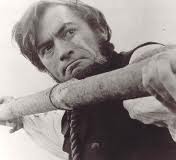 Flavorwire's
Flavorwire's 